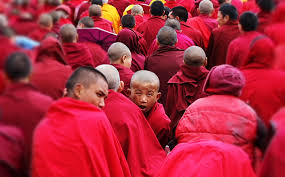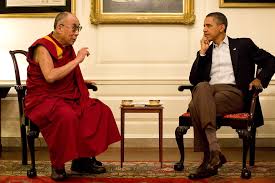The narrator in my head keeps saying that I met the Dalai Lama today. I suppose I did. He just didn’t meet me, or at least, not any more than he met anyone else in the sea of people who filled up Centennial Olympic Park this afternoon under a sky that was both ominous and merciful, as not a drop fell from the clouds.
At about noon today, I decided I had to go. I have a list of people I have to see before I die: His Holiness, Sir Elton, Sweet Baby James, and the Divine Miss M. In that order. So, I finished up my work and ducked out of the office at 3:30, got on a MARTA train to avoid traffic and walked the rest of the way downtown to the park, half-hoping and half-afraid that somebody was selling vinyl rain panchos bearing the Tibetan flag.
How I met Dalai Lama
There, on a small cushioned seat, was a small sitting man in robes who kept his palms pressed together, bowing slightly each time a senator, or the Emory president would welcome him again. When I saw him, I pretended I was stifling a cough because I had, quite unexpectedly, burst into tears. Every trite and indulgent description I had heard about seeing him was true. You don’t just see the Dalai Lama, you feel him. You don’t have to be a Buddhist or a pacifist or a hippie to feel him, although I’m not certain how I know this, since most people who know me would describe me as at least one of these things. But, I’m certain, that if you have a metaphorical heart, you’d metaphorically become aware of its beating in your body, happily impermanent and delightfully suffering through life.
He laughed. He lost his train of thought and so made us laugh. He told us how to change the world, how we must disarm ourselves of negative emotions: anger, hate, violence, jealousy in order to disarm the world. He had no script, no prepared speech. He stood up there with ease, and just talked to us. This is why I keep forgetting that I didn’t actually meet him.
When he finished, we all stood. He bowed to us. We bowed to him. And then he was gone, and the girls in the long skirts and patchwork bags lit up clove cigarettes. The group in suits grabbed their cushions, dusted off and moved briskly toward the Coke building. Students slung on their backpacks, couples grabbed children by the hand, and everyone filed out. Over where the fountain usually sprays water straight from the ground (we’re in a drought, the fountains are off) three monks stood smiling in their robes as a woman in turquoise took a photograph at their request, with their digital camera. Hundreds of people gathered under a tarp at the Tibetan Bazaar, where monks from the Drepung Loseling monastary sold t-shirts, singing bowls, prayer wheels, and mandalas.

I walked to the center of the park, in front of the stage where the empty seat of the Dalai Lama remained, and I sat on the grass. Monks were chanting over the speakers. Behind me a couple sat in half-lotus, his hair was long and hers was shaved, and they leaned toward each other, both slightly smiling, with their foreheads touching. It was beautiful and embarrassing, the way they were willing to love each other. I realized I wanted to believe that they were posing, even flaunting somehow, their spirituality, but they weren’t. I sat in the middle of the park until I was surrounded by wax paper Coke cups, butts of clove cigarettes, abandoned tarps, trash. I watched the monks file out on the side of the stage and disappear into a railed-off curtained area just like the almost-famous rock stars do after a concert.
The feeling of Seeing Dalai Lama Personally
I want to tell you that there was something bizarre about how it smelled like carnival food. I want to tell you that I think (and I’ve heard) that some of the Emory students were drunk. But, this somehow did not detract from the authenticity of seeing the Dalai Lama speak in person, nor did that the atmosphere was tainted with disrespect, with consumerism, with a lack of awareness for that which is sacred. It just didn’t. Without sounding too Eliadean, the experience wasn’t auspicious despite the vulgarity of American culture, but because of it. It was hopeful to me that the same people who ate French fries, also applauded when the Dalai Lama called for us to make the 21st century the “Age of Dialogue,” citing war as obsolete. Some of them wanted to light up cigarettes (and, mercifully, knew better) but were overcome enough to stand when he implored us to find greatness and value in religious diversity. Some people whistled and hollered like one would at a rock concert, but, hey-they were listening and accepting some pretty radical ideas, like peace and love and compassion for everyone, even the girl who was wearing a Tibetan flag to keep her shoulders dry, even the person who broke into your car and stole your brand new iPod, even for the sinners and the scorned and dirty and starved and mad. It’s certain hate doesn’t change a soul.

After His Holiness left the stage, and most people had begun to walk to the restaurants downtown, towards their parking space, or towards MARTA, one woman stood by the guardrail. As the monks walked by and ducked into the curtains, she blew bubbles at them. I thought it was odd, uncomfortably bold, but as each monk came out, he burst into laughter, waved at them, popping them with his hands. It’s a metaphor so obvious, that I’m not even sure if it is a metaphor, or if it was one of those rare times when the literal speaks for itself.






